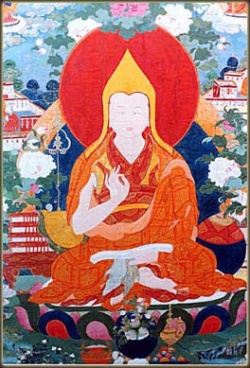Difference between revisions of "Dalai"
(Created page with "thumb|250px| Dalai, meaning ‘Ocean of Wisdom,’ and Lāma meaning ‘highest’ is the title given to the spiritual and secular rulers of Tibet ...") |
|||
| Line 1: | Line 1: | ||
[[File:12thDalai Lama.jpg|thumb|250px|]] | [[File:12thDalai Lama.jpg|thumb|250px|]] | ||
| − | Dalai, meaning ‘Ocean of Wisdom,’ and Lāma meaning ‘highest’ is the title given to the spiritual and secular rulers of Tibet since the 15th century. Each Dalai Lāma is believed by Tibetans to be his predecessor reborn. All Dalai Lāmas are monks of the Gelupa sect of Tibetan Vajrayāna Buddhism and are also believed by Tibetans to be emanations of Avalokiteśvara, the bodhisattva of compassion. The present Dalai Lāma, the 14th in the line, is a teacher, scholar and statesman of outstanding ability and was awarded the Nobel Prize in 1989. In 1959 he was forced to flee from his country by the Chinese communists and since then has lived in exile in India. The institution of religio-political leaders who are supposedly their predecessors reborn, is unique to Tibet and those lands influenced by Tibetan culture – Mongolia, Bhutan and Ladakh. | + | [[Dalai]], meaning ‘Ocean of [[Wisdom]],’ and [[Lāma]] meaning ‘highest’ is the title given to the [[spiritual]] and secular rulers of [[Tibet]] since the 15th century. Each [[Dalai Lāma]] is believed by [[Tibetans]] to be his predecessor [[reborn]]. All [[Dalai]] Lāmas are [[monks]] of the Gelupa sect of [[Tibetan]] [[Vajrayāna]] [[Buddhism]] and are also believed by [[Tibetans]] to be [[emanations]] of [[Avalokiteśvara]], the [[bodhisattva]] of [[compassion]]. The present [[Dalai Lāma]], the 14th in the line, is a [[teacher]], [[scholar]] and statesman of [[outstanding]] ability and was awarded the Nobel Prize in 1989. In 1959 he was forced to flee from his country by the {{Wiki|Chinese}} communists and since then has lived in exile in [[India]]. The institution of religio-political leaders who are supposedly their predecessors [[reborn]], is unique to [[Tibet]] and those lands influenced by [[Tibetan]] {{Wiki|culture}} – [[Mongolia]], [[Bhutan]] and [[Ladakh]]. |
| − | My Land and My People, The Dalai Lama | + | My Land and My [[People]], The [[Dalai Lama]]. |
{{R}} | {{R}} | ||
[http://www.buddhisma2z.com/content.php?id=92 www.buddhisma2z.com] | [http://www.buddhisma2z.com/content.php?id=92 www.buddhisma2z.com] | ||
Revision as of 22:16, 5 September 2013
Dalai, meaning ‘Ocean of Wisdom,’ and Lāma meaning ‘highest’ is the title given to the spiritual and secular rulers of Tibet since the 15th century. Each Dalai Lāma is believed by Tibetans to be his predecessor reborn. All Dalai Lāmas are monks of the Gelupa sect of Tibetan Vajrayāna Buddhism and are also believed by Tibetans to be emanations of Avalokiteśvara, the bodhisattva of compassion. The present Dalai Lāma, the 14th in the line, is a teacher, scholar and statesman of outstanding ability and was awarded the Nobel Prize in 1989. In 1959 he was forced to flee from his country by the Chinese communists and since then has lived in exile in India. The institution of religio-political leaders who are supposedly their predecessors reborn, is unique to Tibet and those lands influenced by Tibetan culture – Mongolia, Bhutan and Ladakh.
My Land and My People, The Dalai Lama.
